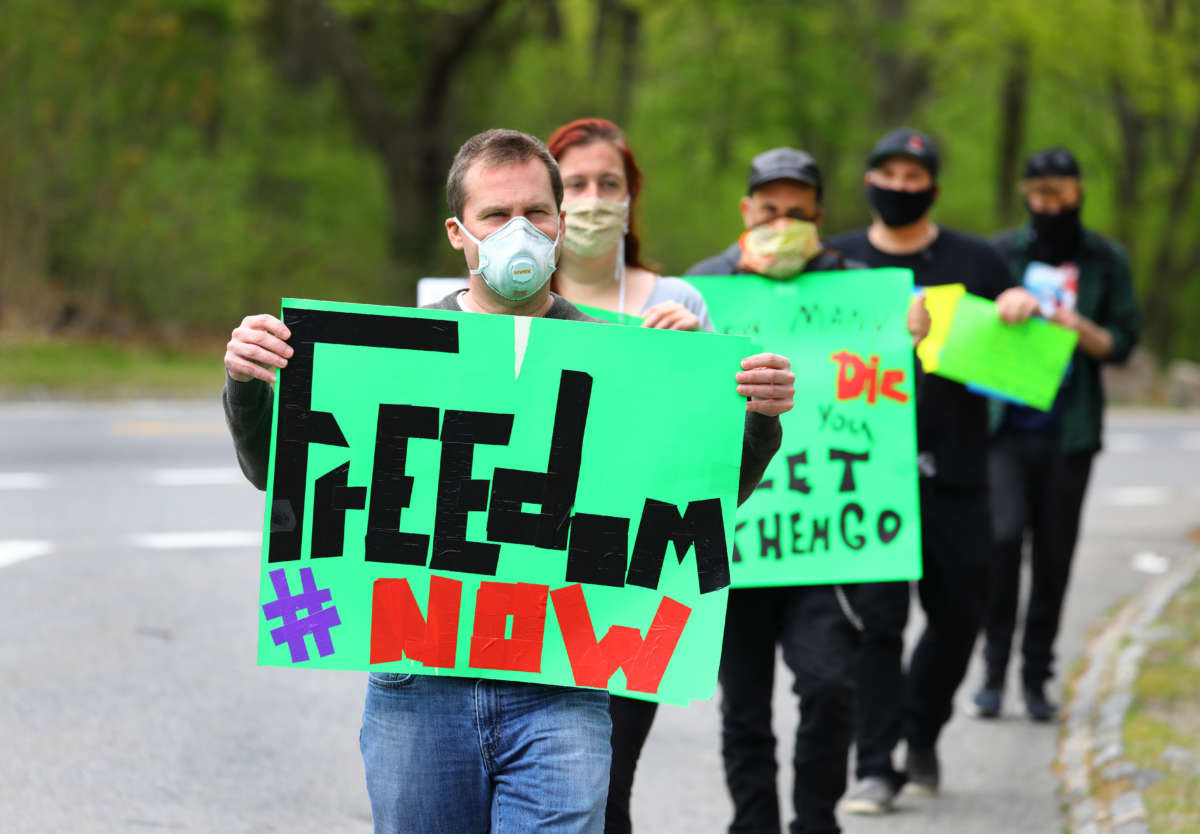Part of the Series
Despair and Disparity: The Uneven Burdens of COVID-19
When most people speak of invisibility right now, they’re speaking of germs — those too-small-to-be-seen strands of coronavirus that are circling the world so ferociously. And yet so many full-sized and visible humans are being treated as if they just aren’t there.
With every pronouncement to “just stay home,” we fail to see those who are unhoused and living on the streets. With every urging to stay “socially distanced,” we miss all those who are forced to share overcrowded sleeping quarters in prisons and jails. And, with every sentence we utter about the importance of wearing masks, we fail to recognize the non-white people for whom that might actually not be so safe, and act as if people trapped in inpatient psychiatric units — who have absolutely no control over their access to personal protective equipment (PPE) like masks and gloves — simply don’t exist.
There has long been concern that psychiatric treatment facilities are misnamed in that their mission so often seems geared toward containment over rehabilitation, no matter how they choose to portray themselves. Poet Anita D has won widespread recognition for her poem, “And the Psych Ward Says,” in which she powerfully details just what that lack of real help can look like from the inside: “Remember, you are only here for three days, so take advantage of the 5 to 10 minutes you have with the doctor. But, understand he has a list of patients as long as his pay stubs, so you won’t be receiving any actual therapy sessions while you’re here.”
The COVID-19 crisis has served to bring this issue into focus. For example, pre-crisis, hospitals across the nation would typically insist that someone isn’t “participating in treatment” if they weren’t regularly going to groups in the unit, no matter how inane some of them were. Yet now, many of those same hospitals are insisting that — with all groups canceled — they’re still able to provide treatment at the same time that they’re asking people to quarantine in those very same rooms. And, the hospitals that have continued to hold groups — sometimes with people asked to sit nearly shoulder-to-shoulder — aren’t in any better position to defend their choices as they recklessly put the lives of both their staff and those hospitalized at serious risk.
However, the issues don’t stop there. One of the most pronounced concerns is the simple lack of transparency about transmission rates and response plans or guidance at both the state and facility level. This leaves vulnerable people often held against their will in environments where visitor access has temporarily been eliminated, and there’s no real way to get information about what’s going on. The conditions appear to mirror one another from state to state. Whether we look to New York, Texas, Washington State, Washington, D.C., or beyond, both patients and staff are feeling forgotten. A search on “coronavirus” and “psychiatric hospital” in virtually any state brings troubling results.
Anonymous reports from staff who are terrified of being fired also suggest that some facilities are so understaffed that they’re unable to consistently follow any amended cleaning protocols — or even (in some instances) properly deliver the psychiatric drugs and medications that hospital doctors themselves have prescribed. Medical responses have also apparently been delayed, with people reporting COVID-like symptoms for days before being addressed. PPE has not consistently been available in an equitable fashion to both workers and patients. Some facilities still have three, four and sometimes even five people sleeping in the same room. Thus, the resultant deaths have begun.
The only real way to demonstrate that we as a society see the humans behind the numbers is to demand transparency about what exactly is happening behind all those locked doors and to recognize the need to let people go. Prisons in some areas have begun to accelerate release dates for many individuals. Gov. Ned Lamont in Connecticut has at least agreed to “mull over” the release of those being held in their state-run psychiatric facilities following compelling advocacy efforts on the part of the Connecticut Legal Rights Project. In Massachusetts, where it was recently revealed that one psychiatric facility has a 90 percent infection rate among its patients, my organization, the Western Massachusetts Recovery Learning Community, is leading the charge to ask Gov. Charlie Baker, the Executive Office of Health and Human Services and the Department of Mental Health to do the same. We have been joined in our efforts by a variety of disability rights attorneys and the Massachusetts Chapter of the ACLU (among others) in asking the Commonwealth to take a hard look at what’s happening, and take expedient measures to change course and save lives.
As we call for the releases of people from jails and prisons, we must call for the release of involuntarily confined people at psychiatric hospitals. We must call for resources for those who are released, including emergency housing and community support dollars. It’s clear that holding people in congregate environments dramatically increases risk of coronavirus-related illness up to and including death. All that remains to be seen is how strongly our government officials feel about being on the right side of history.
Speaking against the authoritarian crackdown
In the midst of a nationwide attack on civil liberties, Truthout urgently needs your help.
Journalism is a critical tool in the fight against Trump and his extremist agenda. The right wing knows this — that’s why they’ve taken over many legacy media publications.
But we won’t let truth be replaced by propaganda. As the Trump administration works to silence dissent, please support nonprofit independent journalism. Truthout is almost entirely funded by individual giving, so a one-time or monthly donation goes a long way. Click below to sustain our work.
